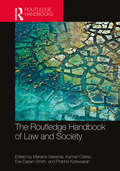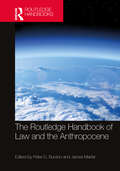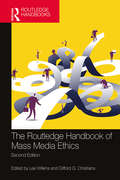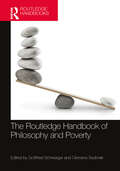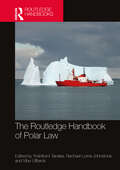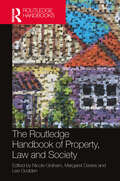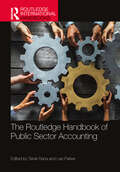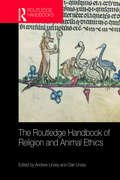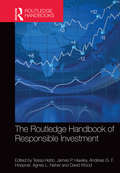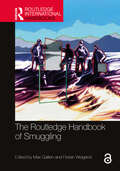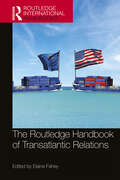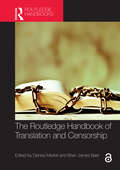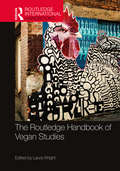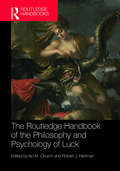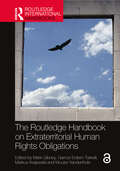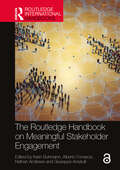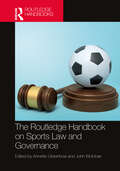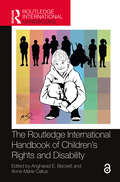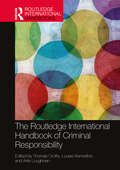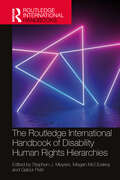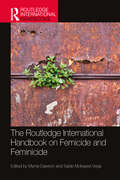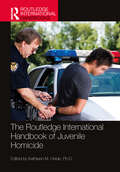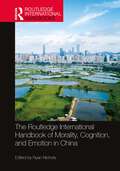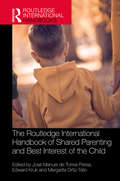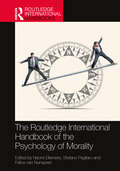- Table View
- List View
The Routledge Handbook of Law and Society
by Mariana Valverde Prabha Kotiswaran Eve Darian-Smith Kamari ClarkeThis innovative handbook provides a comprehensive, and truly global, overview of the main approaches and themes within law and society scholarship or social-legal studies. A one-volume introduction to academic resources and ideas that are relevant for today’s debates on issues from reproductive justice to climate justice, food security, water conflicts, artificial intelligence, and global financial transactions, this handbook is divided into two sections. The first, ‘Perspectives and Approaches’, accessibly explains a variety of frameworks through which the relationship between law and society is addressed and understood, with emphasis on contemporary perspectives that are relatively new to many socio-legal scholars. Following the book’s overall interest in social justice, the entries in this section of the book show how conceptual tools originate in, and help to illuminate, real-world issues. The second and largest section of the book (42 short well-written pieces) presents reflections on topics or areas concerning law, justice, and society that are inherently interdisciplinary and that are relevance to current – but also classical – struggles around justice. Informing readers about the lineage of ideas that are used or could be used today for research and activism, the book attends to the full range of local, national and transnational issues in law and society. The authors were carefully chosen to achieve a diverse and non-Eurocentric view of socio-legal studies. This volume will be invaluable for law students, those in inter-disciplinary programs such as law and society, justice studies and legal studies, and those with interests in law, but based in other social sciences. It will also appeal to general readers interested in questions of justice and rights, including activists and advocates around the world.
The Routledge Handbook of Law and the Anthropocene
by Peter D. Burdon and James MartelThe Routledge Handbook of Law and the Anthropocene provides a critical survey into the function of law and governance during a time when humans have the power to impact the Earth system. The Anthropocene is a “crisis of the earth system.” This book addresses its implications for law and legal thinking in the twenty-first century. Unpacking the challenges of the Anthropocene for advocates of ecological law and politics, this handbook pursues a range of approaches to the scientific fact of anthropocentrism, with contributions from lawyers, philosophers, geographers, and environmental and political scientists. Rather than adopting a hubristic normativity, the contributors engage methods, concepts, and legal instruments in a way that underscores the importance of humility and an expansive ethical worldview. Contributors to this volume are leading scholars and future leaders in the field. Rather than upholding orthodoxy, the handbook also problematizes received wisdom and is grounded in the conviction that the ideas we have inherited from the Holocene must all be open to question. Engaging such issues as the Capitalocene, Gaia theory, the rights of nature, posthumanism, the commons, geoengineering, and civil disobedience, this handbook will be of enormous interest to academics, students, and others with interests in ecological law and the current environmental crisis.
The Routledge Handbook of Mass Media Ethics
by Lee Wilkins Clifford G. ChristiansThis fully updated second edition of the popular handbook provides an exploration of thinking on media ethics, bringing together the intellectual history of global mass media ethics over the past 40 years, summarising existing research and setting future agenda grounded in philosophy and social science. This second edition offers up-to-date and comprehensive coverage of media ethics, including the ethics of sources, social media, the roots of law in ethics, and documentary film. The wide range of contributors include scholars and former professionals who worked as journalists, public relations professionals, and advertising practitioners. They lay out both a good grounding from which to begin more in-depth and individualized explorations, and extensive bibliographies for each chapter to aid that process. For students and professionals who seek to understand and do the best work possible, this book will provide both insight and direction. Standing apart in its comprehensive coverage, The Routledge Handbook of Mass Media Ethics is required reading for scholars, graduate students, and researchers in media, mass communication, journalism, ethics, and related areas.
The Routledge Handbook of Philosophy and Poverty (Routledge Handbooks in Applied Ethics)
by Gottfried Schweiger Clemens SedmakThe problem of poverty is global in scope and has devastating consequences for many essential aspects of life: health, education, political participation, autonomy, and psychological well-being. The Routledge Handbook of Philosophy and Poverty presents the current state of philosophical research on poverty in its breadth and depth. It features 39 chapters divided into five thematic sections: Concepts, theories, and philosophical aspects of poverty research Poverty in the history of Western philosophy and philosophical traditions Poverty in non-Western philosophical thought Key ethical concepts and poverty Social and political issues The handbook not only addresses questions concerning individual, collective, and institutional responsibility towards people in extreme poverty and the moral wrong of poverty, but it also tackles emerging applied issues that are connected to poverty such as gender, race, education, migration, and climate change. Additionally, it features perspectives on poverty from the history of Western philosophy, as well as non-Western views that explore issues unique to the Global South. Finally, the chapters in the first part provide an overview of the most important aspects of social science poverty research, which serves as an excellent resource for philosophers and philosophy students unfamiliar with how poverty is empirically researched in practice. The Routledge Handbook of Philosophy and Poverty is an essential resource for students and researchers in philosophy, political science, sociology, development studies, and public policy who are working on poverty.
The Routledge Handbook of Polar Law (Routledge Handbooks in Law)
by Yoshifumi Tanaka Vibe Ulfbeck Rachael Lorna JohnstonePolar law describes the normative frameworks that govern the relationships between humans, States, Peoples, institutions, land and resources in the Arctic and the Antarctic. These two regions are superficially similar in terms of natural environmental conditions but the overarching frameworks that apply are fundamentally different. The Routledge Handbook of Polar Law explores the legal orders in the Arctic and Antarctic in a comparative perspective, identifying similarities as well as differences. It points to a distinct discipline of "Polar law" as the body of rules governing actors, spaces and institutions at the Poles. Four main features define the collection: the Arctic-Antarctic interface; the interaction between global, regional and domestic legal regimes; the rights of Indigenous Peoples; and the increasing importance of private law. While these broad themes have been addressed to varying extents elsewhere, the editors believe that this Handbook brings them together to create a comprehensive (if never exhaustive) account of what constitutes Polar law today. Leading scholars in public international and private law as well as experts in related fields come together to offer unique insights into polar law as a burgeoning discipline.
The Routledge Handbook of Property, Law and Society
by Nicole Graham, Margaret Davies and Lee GoddenThis handbook brings together diverse perspectives, major topics, and multiple approaches to one of the biggest legal institutions in society: property. Property touches on many fundamental human questions. It involves decisions about power, economy, morality, work, and ecology. It also involves ideas about where humans fit in the world and how humans relate to more-than-human life. This book will ask in myriad ways such questions as: what property means, what kinds of property there are, what is and should be the relationship between owned and owner, and what is the impact of different forms of property on life in this world? Drawing on a range of socio-legal and empirical methodologies, renowned scholars and rising stars in property from around the world present current issues and map future directions in research. Coming from the place of law but reaching out through cognate disciplines, this handbook provides a comprehensive and accessible survey of current research at the interface of property, society, and the environment. This handbook will appeal to students and researchers across a range of disciplines, including law, sociology, geography, history, and economics.
The Routledge Handbook of Public Sector Accounting (Routledge International Handbooks)
by Lee Parker Tarek RanaThe Routledge Handbook of Public Sector Accounting explores new developments and transformations in auditing, management control, performance measurement, risk management and sustainability work in the contemporary world of the public sector and the functioning of accounting and management in that realm. It focuses on critical analysis and reflection with respect to changing risk and crisis management patterns in the public sector in the current Covid- 19 and post- Covid- 19 era, across diverse social, political and institutional settings globally. This research-based edited book, targeted at scholars, professionals, teachers and consultants inthe fields of public sector accounting, auditing, accountability and management, offers high-level insights into the new architecture and execution of such activities in the emerging post-pandemic world. The chapters are written by leading scholars in the accounting and public administration disciplines internationally and provide important assessments, frameworks and recommendations concerning a wide variety of institutions, practices and policies with a view to addressing the many emerging societal, governmental and professional issues. Spanning theoretical, empirical and policy discussion contributions, the book’s chapters will be readily accessible to accounting, auditing and management audiences alike.
The Routledge Handbook of Religion and Animal Ethics (Routledge Handbooks in Religion)
by Andrew Linzey Clair LinzeyThe ethical treatment of non-human animals is an increasingly significant issue, directly affecting how people share the planet with other creatures and visualize themselves within the natural world. The Routledge Handbook of Religion and Animal Ethics is a key reference source in this area, looking specifically at the role religion plays in the formation of ethics around these concerns. Featuring thirty-five chapters by a team of international contributors, the handbook is divided into two parts. The first gives an overview of fifteen of the major world religions’ attitudes towards animal ethics and protection. The second features five sections addressing the following topics: Human Interaction with Animals Killing and Exploitation Religious and Secular Law Evil and Theodicy Souls and Afterlife This handbook demonstrates that religious traditions, despite often being anthropocentric, do have much to offer to those seeking a framework for a more enlightened relationship between humans and non-human animals. As such, The Routledge Handbook of Religion and Animal Ethics is essential reading for students and researchers in religious studies, theology, and animal ethics as well as those studying the philosophy of religion and ethics more generally.
The Routledge Handbook of Responsible Investment (Routledge Companions in Business, Management and Accounting)
by David Wood James P. Hawley Tessa Hebb Andreas G.F. Hoepner Agnes L. NeherThe UN-supported Principles for Responsible Investment initiative has led to around a third of the world’s financial assets being managed with a commitment to invest in a way that considers environmental, social or governance (ESG) criteria. The responsible investment trend has increased dramatically since the global financial crisis, yet understanding of this field remains at an early stage. This handbook provides an atlas of current practice in the field of responsible investment. With a large global team of expert contributors, the book explores the impact of responsible investment on key financial actors ranging from mainstream asset managers to religious organizations. Offering students and researchers a comprehensive introduction to current scholarship and international structures in the expanding discipline of responsible investment, this handbook is vital reading across the fields of finance, economics and accounting.
The Routledge Handbook of Smuggling (Routledge International Handbooks)
by Max GallienThe Routledge Handbook of Smuggling offers a comprehensive survey of interdisciplinary research related to smuggling, reflecting on key themes, and charting current and future trends. Divided into six parts and spanning over 30 chapters, the volume covers themes such as mobility, borders, violent conflict, and state politics, as well as looks at the smuggling of specific goods – from rice and gasoline to wildlife, weapons, and cocaine. Chapters engage with some of the most contentious academic and policy debates of the twenty-first century, including the historical creation of borders, re-bordering, the criminalisation of migration, and the politics of selective toleration of smuggling. As it maps a field that contains unique methodological, ethical, and risk-related challenges, the book takes stock not only of the state of our shared knowledge, but also reflects on how this has been produced, pointing to blind spots and providing an informed vision of the future of the field. Bringing together established and emerging scholars from around the world, The Routledge Handbook of Smuggling is an indispensable resource for students and researchers of conflict studies, borderland studies, criminology, political science, global development, anthropology, sociology, and geography.
The Routledge Handbook of Transatlantic Relations (Routledge International Handbooks)
by Elaine FaheyThe Routledge Handbook on Transatlantic Relations is an essential and comprehensive reference for the regulation of transatlantic relations across a range of subjects, bringing together contributions from scholars, policy makers, lawyers and political scientists. Future oriented in a range of fields, it probes the key technical, procedural and policy issues for the US of dealing with, negotiating, engaging and law-making with the EU, taking a broad interdisciplinary perspective including international relations, politics, political economic and law, EU external relations law and international law and assesses the external consequences of transatlantic relations in a systematic and comprehensive fashion. The transatlantic relationship constitutes one of the most established and far-reaching democratic alliances globally, and which has propelled multilateralism, trade regulation and the EU-US relationship in global challenges. The different contributions will propose solutions to overcome these problems and help us understand the shifting transatlantic agenda in diverse areas from human rights, to trade, and security, and the capacity of the transatlantic relationship to set new international agendas, standards and rules. The Routledge Handbook on Transatlantic Relations will be a key reference for scholars, students and practitioners of Transatlantic Relations/EU-US relations, EU External Relations law, EU rule-making, EU Security law and more broadly to global governance, International law, international political economy and international relations.
The Routledge Handbook of Translation and Censorship (Routledge Handbooks in Translation and Interpreting Studies)
by Brian James Baer Denise MerkleThe Routledge Handbook of Translation and Censorship is the first handbook to provide a comprehensive overview of the topic, offering broad geographic and historical coverage, and extending the political contexts to incorporate colonial and postcolonial viewpoints, as well as pluralistic societies. It examines key cultural texts of all kinds as well as audio-visual translation, comics, drama and videogames.With over 30 chapters, the Handbook highlights commonalities and differences across the various contexts, encouraging comparative approaches to the topic of translation and censorship. Edited and authored by leading figures in the field of Translation Studies, the chapters provide a critical mapping of the current research and suggest future directions.With an introductory chapter by the editors on theorizing censorship, the Handbook is an essential reference and resource for advanced students, scholars and researchers in translation studies, comparative literature and related fields.Chapter 30 of this book is freely available as a downloadable Open Access PDF at http://www.taylorfrancis.com under a Creative Commons Attribution-Non Commercial-No Derivatives (CC BY-NC-ND) 4.0 license.
The Routledge Handbook of Vegan Studies (Routledge International Handbooks)
by Laura WrightThis wide-ranging volume explores the tension between the dietary practice of veganism and the manifestation, construction, and representation of a vegan identity in today’s society. Emerging in the early 21st century, vegan studies is distinct from more familiar conceptions of "animal studies," an umbrella term for a three-pronged field that gained prominence in the late 1990s and early 2000s, consisting of critical animal studies, human animal studies, and posthumanism. While veganism is a consideration of these modes of inquiry, it is a decidedly different entity, an ethical delineator that for many scholars marks a complicated boundary between theoretical pursuit and lived experience. The Routledge Handbook of Vegan Studies is the must-have reference for the important topics, problems, and key debates in the subject area and is the first of its kind. Comprising over 30 chapters by a team of international contributors, this handbook is divided into five parts: History of vegan studies Vegan studies in the disciplines Theoretical intersections Contemporary media entanglements Veganism around the world These sections contextualize veganism beyond its status as a dietary choice, situating veganism within broader social, ethical, legal, theoretical, and artistic discourses. This book will be essential reading for students and researchers of vegan studies, animal studies, and environmental ethics.
The Routledge Handbook of the Philosophy and Psychology of Luck (Routledge Handbooks in Philosophy)
by Ian M. Church Robert J. HartmanLuck permeates our lives, and this raises a number of pressing questions: What is luck? When we attribute luck to people, circumstances, or events, what are we attributing? Do we have any obligations to mitigate the harms done to people who are less fortunate? And to what extent is deserving praise or blame affected by good or bad luck? Although acquiring a true belief by an uneducated guess involves a kind of luck that precludes knowledge, does all luck undermine knowledge? The academic literature has seen growing, interdisciplinary interest in luck, and this volume brings together and explains the most important areas of this research. It consists of 39 newly commissioned chapters, written by an internationally acclaimed team of philosophers and psychologists, for a readership of students and researchers. Its coverage is divided into six sections: I: The History of Luck II: The Nature of Luck III: Moral Luck IV: Epistemic Luck V: The Psychology of Luck VI: Future Research. The chapters cover a wide range of topics, from the problem of moral luck, to anti-luck epistemology, to the relationship between luck attributions and cognitive biases, to meta-questions regarding the nature of luck itself, to a range of other theoretical and empirical questions. By bringing this research together, the Handbook serves as both a touchstone for understanding the relevant issues and a first port of call for future research on luck.
The Routledge Handbook on Extraterritorial Human Rights Obligations (Routledge International Handbooks)
by Mark Gibney Markus Krajewski Wouter Vandenhole Gamze Erdem TürkelliThe Routledge Handbook on Extraterritorial Human Rights Obligations brings international scholarship on transnational human rights obligations into a comprehensive and wide-ranging volume. Each chapter combines a thorough analysis of a particular issue area and provides a forward-looking perspective of how extraterritorial human rights obligations (ETOs) might come to be more fully recognized, outlining shortcomings but also best state practices. It builds insights gained from state practice to identify gaps in the literature and points to future avenues of inquiry. The Handbook is organized into seven thematic parts: conceptualization and theoretical foundations; enforcement; migration and refugee protection; financial assistance and sanctions; finance, investment and trade; peace and security; and environment. Chapters summarize the cutting edge of current knowledge on key topics as leading experts critically reflect on ETOs, and, where appropriate, engage with the Maastricht Principles to critically evaluate their value 10 years after their adoption. The Routledge Handbook on Extraterritorial Human Rights Obligations is an authoritative and essential reference text for scholars and students of human rights and human rights law, and more broadly, of international law and international relations as well as to those working in international economic law, development studies, peace and conflict studies, environmental law and migration.
The Routledge Handbook on Meaningful Stakeholder Engagement (Routledge International Handbooks)
by Nathan Andrews Karin Buhmann Alberto Fonseca Giuseppe AmatulliMeaningful Stakeholder Engagement (MSE) is both a concept and a management approach, drawing on a combination of theoretical and applied knowledge areas (e.g., impact assessment, business and human rights, and stakeholder theory). MSE has become a key element of corporate sustainability risk-based due diligence as a process that responsible business enterprises are expected to apply to identify and manage harmful impacts on the environment and society.Despite the obvious and growing relevance of meaningful stakeholder engagement, few publications have tried to synthesize the knowledge, academic literature, and practical experience within and around the concept and practices. This volume responds to that knowledge gap through the provision of comprehensive interdisciplinary perspectives. Embodying a rights-holder orientation, The Routledge Handbook on Meaningful Stakeholder Engagement emphasizes the importance of MSE for stakeholders who are or can be affected by activities driven by external actors, such as natural resource extraction or processing; infrastructure; development proposals, planning and implementation; and production for industry or consumption.This handbook offers four thematic sections, all interdisciplinary in character, seeking to explore the multiple aspects of MSE. Moreover, a comprehensive introductory chapter explains key elements of the concept and causes for the current surge in expectations of MSE, including a rise in demands of risk-based due diligence. More than 40 international contributors combine theory and practice in chapters that discuss and elaborate the theory and practice of MSE. Uniquely, each section includes short practice notes based on experiences or dilemmas lived by practitioners or affected people, placing real-life situations into theoretical context. The concluding chapter draws up key insights from the chapters and practice notes, and casts a path for the future of MSE integrating values, norms, and practice.Cutting across multiple disciplines including stakeholder theory, natural resource management, impact assessment, project management, ESG, responsible business, and global value chains, The Routledge Handbook on Meaningful Stakeholder Engagement will be an essential resource for scholars, researchers, developers, investors, affected people, civil society organizations, students, and others.The Open Access version of this book, available at http://www.taylorfrancis.com, has been made available under a Creative Commons Attribution-Non Commercial-No Derivatives (CC-BY-NC-ND) 4.0 license.
The Routledge Handbook on Sports Law and Governance
by Annette Greenhow and John WolohanThe Routledge Handbook on Sports Law and Governance provides a definitive guide to the regulation of international and national sport through the lens of both regulatory, governance and legal frameworks.Over the past several decades, law, regulation and governance associated with international and national sport has grown exponentially, aligned with professional and elite level sport development. The organisation and sophistication of international and national sporting competitions create an environment where pressures such as the sports ethic and strong incentives to win give rise to both novel problems and reoccurring themes. Exploring a wide range of perspectives across disciplines and transcending jurisdictional boundaries, the handbook analyses complex international and national sports challenges. Taking a nuanced approach to traditional themes, it recognises the context and sport as a regulatory domain when applying law and legal frameworks.This book is an essential resource for students and academics exploring issues in international and national sports law, sports regulation and sports governance.
The Routledge International Handbook of Children's Rights and Disability (Routledge International Handbooks)
by Angharad E. Beckett Anne-Marie CallusThis handbook provides authoritative and cutting-edge analyses of various aspects of the rights and lives of disabled children around the world. Taking the UN Convention on the Rights of Persons with Disabilities (CRPD) and the UN Convention of the Rights of the Child (CRC) as conceptual frameworks, this work appraises the current state of affairs concerning the rights of disabled children across different stages of childhood, different life domains, and different socio-cultural contexts. The book is divided into four sections: Legislation and Policy Children’s Voice The Life Course in Childhood Life Domains in Childhood Comprised of 37 newly commissioned chapters featuring analyses of UN documents and case studies from Australia, Brazil, Ethiopia, Hong Kong, Italy, the Netherlands, Norway, Papua New Guinea, Serbia, South Africa, Spain, Sweden, the United Kingdom, the United States, and Vanuatu, its multidisciplinary approach reflects the complexities of the lives of disabled children and the multifarious nature of the strategies needed to ensure their rights are upheld. It will be of interest to researchers and students working in disability studies, education, allied health, law, philosophy, play studies, social policy, and the sociology of childhood. It will also be a valuable resource for professionals/practitioners, allowing them to consider future directions for ensuring that disabled children’s rights are realised and their well-being and dignity are assured.
The Routledge International Handbook of Criminal Responsibility (Routledge International Handbooks)
by Thomas Crofts Arlie Loughnan Louise KennefickPresenting cutting-edge research and scholarship, this extensive volume covers everything from abstract theorising about the meanings of responsibility and how we blame, to analysing criminal law and justice responses, and factors that impact individual responsibility.Inviting exchanges across a burgeoning critical scholarship on criminal responsibility, this Handbook showcases the diverse range of methodologies applied to the field, including socio-political approaches, critical historical methods, criminological and sociological perspectives, and interdisciplinary studies bridging law and the mind sciences. Spanning global networks of established and emerging scholars of responsibility for crime, this book explores how we relate to one another as human beings under the spotlight of the criminal law. In doing so, it is hoped that the collection not only does justice to the vibrant landscape of criminal responsibility studies, but inspires new directions and future synergies in this compelling field.The Routledge International Handbook of Criminal Responsibility will appeal to scholars and students of criminal law, criminal justice, criminology, sociology, psychology, neuroscience, philosophy, and socio-legal studies, as well as practitioners and policymakers working in related fields.
The Routledge International Handbook of Disability Human Rights Hierarchies (Routledge International Handbooks)
by Stephen J. Meyers Megan McCloskey Gabor PetriDisability is defined by hierarchy. Regardless of culture or context, persons with disabilities are almost always pushed to the bottom of the social hierarchy. With the advent of the Convention on the Rights of Persons with Disabilities (2006), disability human rights seemingly provided a path forward for tearing down ableist social hierarchies and ensuring that all persons with disabilities everywhere were treated equally. Despite important progress, the disability human rights project not only remains incomplete, but has often created new hierarchies among persons with disabilities themselves or across the human rights it promotes. Certain groups of persons with disabilities have gained new voices while others remain silenced and certain rights are prioritized over others depending on what states, international organizations, or advocates want rather than what those on the ground need most. This volume was inspired both by the continued need to expose human rights violations against persons with disabilities, but to also explore the nuanced role that hierarchies play in the spread, implementation, and protection of disability human rights. The enjoyment of human rights is not equal nor is the recognition of specific individuals and groups’ rights. In order to change this situation, inequalities across the disability human rights movement must be explored. Divided into five parts: Who counts as disabled? Political, social, and cultural context Which rights on top, whose rights on bottom? Pushed to the periphery in the disability rights movement Representations of disability and comprised of 34 newly-written chapters including case-studies from the Anglophone Caribbean, Bangladesh, Bosnia-Herzegovina, China, Ghana, Haiti, Hungary, India, Israel, Kenya, Latin America, Poland, Russia, Scotland, Serbia and South Africa, and other countries, this book will be of interest to all scholars and students of disability studies, sociology, human rights law and social policy.
The Routledge International Handbook of Femicide and Feminicide (Routledge International Handbooks)
by Myrna Dawson Saide Mobayed VegaThis volume explores in depth femicide and feminicide, bringing together our current knowledge on this phenomenon and its prevention.No country is free from femicide/feminicide, which represents the tip of the iceberg in male violence against women and girls. Therefore, it is crucial and timely to better understand how states and their citizens are experiencing and responding to femicide/feminicide globally. Through the work of internationally recognised feminist and grassroots activists, researchers, and academics from around the world, this handbook offers the first in-depth, global examination of the growing social movement to address femicide and feminicide. It includes the current state of knowledge and the prevalence of femicide/feminicide and its characteristics across countries and world regions, as well as the social and legal responses to these killings. The contributions contained here look at the accomplishments of the past four decades, ongoing challenges, and current and future priorities to identify where we need to go from here to prevent femicide/feminicide specifically and male violence against women and girls overall.This transnational, multidisciplinary, cross-sectoral handbook will contribute to research, policy, and practice globally at a time when it is needed the most. It brings a visible, global focus to the growing concern about femicide/feminicide, underscoring the importance of adopting a human rights framework in working towards its prevention, in an increasingly unstable global world for women and girls.
The Routledge International Handbook of Juvenile Homicide (Routledge International Handbooks)
by Kathleen M. HeideThe Routledge International Handbook of Juvenile Homicide is the definitive work on juvenile homicide. This volume provides an up-to-date, comprehensive, and in-depth exploration of what is known about juveniles involved in murder. Taking an interdisciplinary approach to juvenile homicide, this handbook brings together the leading experts in social sciences, mental health, and law from many countries. The volume covers the phenomenon of juvenile homicide from beginning to end, by addressing the questions “why do kids kill?” all the way to “how does society stop them from killing?”. The tough issues involved in sentencing youths who take the lives of others, often deliberately and in horrific ways, are confronted through chapters addressing the legal issues, child development factors, risk assessment, public attitudes, and ethical concerns. The volume brings together research specifically conducted for this volume, in addition to summaries and discussions of clinical and empirical findings. Each chapter ends with key takeaway points. Contributors include psychologists, psychiatrists, criminologists, sociologists, lawyers, economists, biologists, epidemiologists, and public health and public policy experts. Uniquely, they examine murder by juveniles across the globe. The volume includes research pertaining to the causes, correlates, and theoretical explanations of juvenile homicide offending. Moving beyond discussions of juvenile homicide offenders (JHOs) as a homogenous group, the volume includes research on specific types of JHOs and research investigating age and gender differences among JHOs. In addition, it draws attention to the empirical factors associated with juvenile homicide offending, effective treatment of JHOs, recidivism, and prevention of violent behavior. The volume also makes recommendations for policy and practice, including how to shift government policy from punishing lawbreakers to saving lives. This volume is essential reading for scholars and students researching youth violence/juvenile homicide across a variety of disciplines including criminology, criminal justice, law, psychology, psychiatry, sociology, social work, public health, and education. It is also an invaluable reference for mental health professionals, practitioners in the juvenile and criminal justice systems, policymakers, and government leaders.
The Routledge International Handbook of Morality, Cognition, and Emotion in China (Routledge International Handbooks)
by Ryan NicholsThis ground-breaking handbook provides multi-disciplinary insight into Chinese morality, cognition and emotion by collecting in one place a comprehensive collection of essays focused on Chinese morality by world-leading experts from more than a dozen different academic fields of study. Through fifteen substantive chapters, readers are offered a holistic look into the ways morality could be interpreted in China, and a broad range of theoretical perspectives, including ecological, anthropological and cultural neuroscience. Offering a syncretic, multi-disciplinary overview that moves beyond the usual western-oriented perspective of China as a monolithic culture, research questions addressed in this book focus on morality as represented at the level of the individual, rather than at the group or institutional levels. Research questions explored herein include: What are the major contours of distinctively Chinese morality? What was the role of the ancient ecology, climate, and pathogen load in producing Chinese moral attitudes and emotions? Are ingredients of the good life in China different than ingredients of the good life elsewhere? How are children in China morally educated? How do findings from cultural neuroscience help us understand differences in the treatment of family members, or the treatment of strangers, in China and elsewhere? How do the protests in Hong Kong participate in, or stand apart from, the ongoing ethics of protest in historical China? The clear structure and accessible writing offer a rigorous assessment of the ways in which morality can be interpreted, shedding light on differences between China and Western cultures. The book also provides a timely window into Chinese forms of morality, and the pivotal role these play in social organization, family relationships, systems of government, emotion and cognition. Representing fields of study ranging from philosophy, linguistics, archaeology, history, and religion, to social psychology, neuroscience, clinical psychology, developmental psychology, and behavioral ecology, this is an essential text for students, academics, and others with wide interest in Chinese culture.
The Routledge International Handbook of Shared Parenting and Best Interest of the Child
by José ManuelThis multidisciplinary volume offers an essential, comprehensive study of perspectives on the scope and application of the best interests of the child and focuses mainly on its application in relation to child custody. With expert contributions from psychological, sociological and legal perspectives, it offers scientific analysis and debate on whether it should be the primary consideration in deciding child custody cases in cases of divorce or separation or whether it should be one of several primary considerations. It explores complex dilemmas inherent in shared parenting and whether the advantages it offers children are sufficient when compared to attributing custody to one parent and limiting visitation rights of the other. Offering a comprehensive analysis of this complex topic, chapters provide detailed insight into the current state of research in this area, as well as expert guidelines aimed at resolving the controversies when parents agree or disagree over their children’s living arrangements. Cutting-edge topics explored include: transnational shared parenting; alternative dispute resolution; breastfeeding parents; religious disputes between parents and the psychological, social and economic factors that affect shared parenting. The Routledge International Handbook of Shared Parenting and Best Interest of the Child will be essential reading for scholars and graduate students in law, psychology, sociology and economics interested in shared parenting and family law.
The Routledge International Handbook of the Psychology of Morality (Routledge International Handbooks)
by Naomi Ellemers Stefano Pagliaro Félice Van NunspeetThis cutting-edge handbook examines moral psychology and behavior, uncovering layers of human morality through a comprehensive overview of topics and approaches. Featuring an array of expert international contributors, the book addresses five key themes: moral reasoning, moral judgments, moral emotions, moral behavior and moral self-views. Each section includes empirical chapters that address these themes at the intrapersonal, interpersonal, intragroup or intergroup level. Each section starts with a reflective chapter from a leading scholar in this field of study who shares their personal vision on key issues and future developments. Drawing on emerging research and featuring real-world examples, the book offers a deeper understanding of the social psychological factors that shape our moral behavior and how this plays out in our daily lives. The Routledge International Handbook of the Psychology of Morality will be essential reading for academics and students in social psychology, the psychology of morality, business ethics and related areas. It will also be a compelling resource for legal and HR professionals, policy makers and anyone interested in understanding the complex and multi-faceted nature of human morality.
